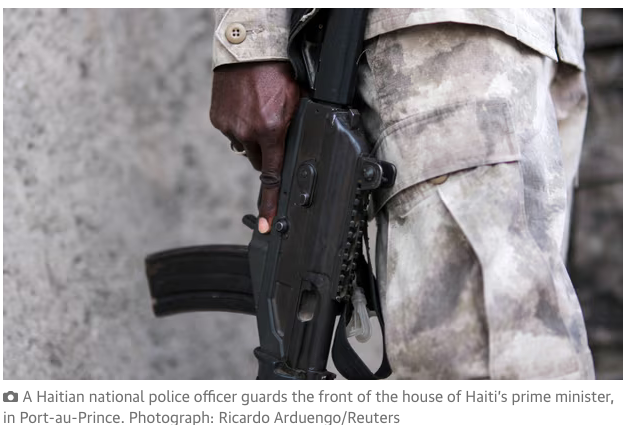Groups say move could worsen country’s security crisis given police force’s poor human rights record
An offer from Kenya to dispatch police officers to Haiti has been welcomed by officials in the embattled Caribbean nation – but prompted concern among human rights groups who say the move could worsen the country’s security crisis.
Haiti’s prime minister, Ariel Henry, requested international support from the UN last year when gangs began taking control of much of the country, engulfing the nation in chaos as they fought pitched street battles.
The pledge this week from Kenya to “deploy a contingent of 1,000 police officers to help train and assist Haitian police restore normalcy in the country and protect strategic installations” has been welcomed by Canada, the US and the UN secretary general.
The unexpected prospect of Kenyan officers being sent across the Atlantic has raised concerns from experts and civil society groups, however, given the police force’s poor human rights record.
Kenyan riot police beat protesters and gunned down civilians during the country’s Covid-19 curfews and never sufficiently addressed the grave rights violations, according to Human Rights Watch.
As many as 30 people in Kenya’s poorest neighbourhoods were killed by the police in July during protests over the rising cost of living, a local group told Associated Press. Police are also accused of carrying out forced disappearances.
“We had some consultations with Kenyan [civil society organisations] last week and there was general consensus that Kenya should not be seen to be exporting its abusive police to other parts of the world,” said Otsieno Namwaya, east Africa director for the Human Rights Watch.
Haitians will be especially wary of any human rights abuses given the country’s long and dark history of failed foreign intervention. UN peacekeepers were accused of sexually abusing women, leaving hundreds of fatherless children behind and introducing cholera.
Kenya has participated in several UN peacekeeping missions across Africa and received counter-terror training from the US, meaning they have some of the necessary experience to take on Haiti’s armed bandits, said Benedict Manzin, Lead Analyst for the Middle East and Africa at risk analysis firm, Sibylline.
“Their record is mixed, however,” Manzin said. “In Somalia, where Kenyan forces have supported offensive operations, al-Shabaab attacks continue despite the Kenyans operating there for over a decade.”
Kenyan peacekeepers were accused of supporting local smuggling rings, Manzin added. With armed groups extorting much of Haiti’s business and corruption penetrating the highest levels of politics and policing, any external force is likely to become entangled in Haiti’s criminal economy.
But proponents of intervention argue that Haiti cannot be left to suffer alone. Its brutal armed gangs routinely commit human rights abuses – including using sexual violence as a weapon – and Haitian police, outgunned and outmanned, have been powerless to stop them.
The criminal groups capitalised on a power vacuum in the wake of the assasination of President Jovenel Moïse in 2021 and now control two-thirds of the capital along with key roads and ports.
About 200 factions have paralysed much of Haiti’s economy, triggering the worst hunger crisis in the country’s historyand contributing to the return of cholera.
The security situation has deteriorated again in recent months with at least 75 people killed and 40 abducted from 1 May to 12 July, according to Haiti’s National Human Rights Defense Network.
The 1,000 additional officers will be a boost to Haitian police but they will need more reinforcements if they want to vanquish the criminal groups and retake control of the country rather than just containing them, said Louis-Henri Mars, founder of Lakou Lapè, a local peace-building organisation.
Haiti has about 9,500 police officers serving its population of 12 million and no army as it was disbanded for staging coups.
“I am not sure that the Kenyan police has the capacity to lead such a force and they do not seem to have a good reputation,” Mars said.
Meanwhile, the armed groups are “incredulous” at the news that they might soon be facing Kenyan police officers, rather than combat-trained soldiers from the US or elsewhere, he said.
Kenya’s foreign office says its forces are being volunteered in the name of African solidarity but they do not speak French or creole, which will limit their dialogue with locals.
The Bahamas has offered to contribute an additional 150 officers to the taskforce.
Washington has commended Kenya’s offer given that no other nation had stepped up to lead the mission. Kenyan officials say they will run an assessment mission in the coming weeks.
But if peacekeepers are to prevent a repeat of previous disasters there must be a long-term plan to prepare the Haiti’s own security forces to maintain order once foreign forces return home, say local rights groups.
There must also be plans for a transitional government, rights groups and the Haitian opposition say.
Henry became Haiti’s interim leader following Moïse’ assassination by Colombian mercenaries and his administration no longer has a single elected official.
The government is widely accused of being responsible for the expansion of the gangs who now control much of the country, having previously partnered with paramilitary factions to coerce voters.
“Yes we need outside force,” said a consultant to NGOs in Port-au-Prince who requested anonymity to avoid reprisals from the gangs. “But we also need to ensure that this force is on the side of the population, not of this government and those responsible for the current state of Haiti. There is a real fear that if not done well it will make things worse.”
